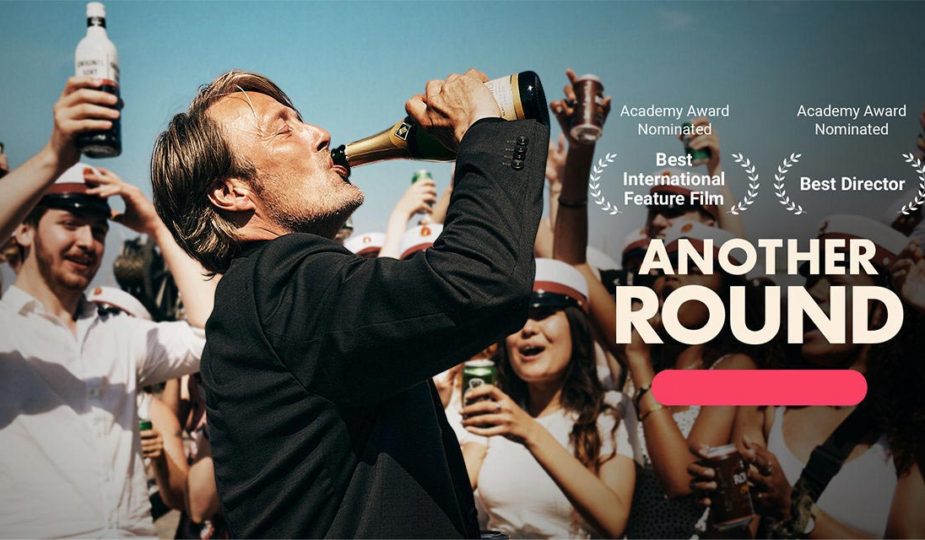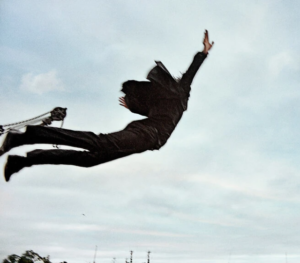
Another Round (2020)
Thomas Vinterberg is a Danish director and screenwriter, known for being one of the co-founders of Dogma 95 alongside filmmakers such as Lars von Trier, Kristian Levring, Jean-Marc Barr and Søren Kragh-Jacobsen. The cinematographic movement sought to rescue the purity of cinema through a list of rules that, among other guidelines, dictated filmmakers to focus on plots with a greater emotional and psychological load, make use of handheld camera, abandon artificial lighting and special effects. And although the movement had a great impact on cinema, it was dissolved in 2005. However, Vinterberg still continues to be one of the most important directors of contemporary European cinema. Through films like The Celebration (1998), Submarino (2010) and The Hunt (2012); Vinterberg deals with complex topics such as human decadence, the dark side of society, dysfunctional family relationships and the severity of mental illnesses.
Another Round (2020) is one of Vinterberg’s most ambitious, spectacular and powerful works. This brilliant story is influenced by Finn Skårderud, a Norwegian psychiatrist who coined the theory that human beings have a deficit of 0.05% of alcohol in their blood. According to Skårderud, a little ethyl boost would take our spirits to a better place and enhance our everyday lives, because the disinhibition that comes from the hand of liquor releases the creativity that lingers within our brains. Danish philosopher Søren Kierkegaard opens up the scenario with a powerful quote taken from Diapsalmata (1843): “What is youth? A dream. What is love? The continuation of that dream”. These words lay out the foundation for the events that will take place during the next two hours. In Another Round, Skårderud’s theory is being put to test by Martin (Mads Mikkelsen), a history teacher at a Danish high school who struggles in his personal and professional life. Joined by three friends who are also his colleagues, Martin decides to formalize the experiment with guidelines and a blog. For this, Martin and his friends Tommy (Thomas Bo Larsen), Peter (Lars Ranthe) and Nikolaj (Magnus Millang) are inspired by the exploits of famous alcoholics and historic figures such as Churchill or Hemingway.
 It’s all good at first. Martin takes a few shots of Smirnoff in the school’s bathroom and uses a breathalyzer to establish the alcohol limit of 0.05%. As a result, his classes become more dynamic and the young students connect with the history lessons. The same thing happens with the respective works of his companions. The friendship of the four grows in proportion to the number of shots of vodka they drink. Martin begins to regain his happiness and improve the relationship with his wife. This success justifies the alcohol consumption which inevitably increases to dangerous proportions. Soon, the lies begin and it becomes clear that each advance of the pseudo-investigation is to justify the own alcoholism. Until then, these men are desperate to escape from their lives marked by loneliness, indifferent wives and the noise of children. The alcohol starts to expose their conflicts.
It’s all good at first. Martin takes a few shots of Smirnoff in the school’s bathroom and uses a breathalyzer to establish the alcohol limit of 0.05%. As a result, his classes become more dynamic and the young students connect with the history lessons. The same thing happens with the respective works of his companions. The friendship of the four grows in proportion to the number of shots of vodka they drink. Martin begins to regain his happiness and improve the relationship with his wife. This success justifies the alcohol consumption which inevitably increases to dangerous proportions. Soon, the lies begin and it becomes clear that each advance of the pseudo-investigation is to justify the own alcoholism. Until then, these men are desperate to escape from their lives marked by loneliness, indifferent wives and the noise of children. The alcohol starts to expose their conflicts.
While the character of Mikkelsen is the main protagonist, the rest of friends also face their own problems. Nikolaj deals with the challenges of parenting in a large family with three little children. Tommy finds in alcohol a new friend to ease the crushing loneliness that has been chasing him. Deep down, what they all share is that fear of being forgotten, that their life has been so boring that no one else bothers to pronounce their name once they have ceased to exist. Vinterberg doesn’t pass a judgment on the social relevance of alcohol. In fact, what happens to these characters is an existential crisis that is wrongly overcome by being constantly intoxicated. Therefore, the reiteration to Kierkegaard in the film seems more than appropriate. When one of the friends gives one of his students some alcohol to relax during his oral exam, he refers to the philosopher’s concept of anguish: “How a human being copes the notion of failing and having failed: accept yourself as fallible to love others and life“. Martin and the others cannot accept their professional and personal failures, so they adapt the phrase “To dare is to lose your balance momentarily“.
 Druk (the film’s original title) means “being drunk”, but in this case it acquires the meaning of being lucid. Being drunk makes the four friends able to see new points of view. As in life, every decision has its consequences and alcohol brings that consequence to its pure state, without distractions. The daily routine is no longer an impediment to see reality and face their lives. Alcohol will unite these teachers with their students, they are going to re-learn the importance of enjoying the moment with hopes and troubles, and they’ll also re-experience those moments when their limits are fiercely challenged. As a consequence, the film concludes with an optimistic tone without glorifying or moralizing alcohol abuse, and gives us one of the most beautiful, life-affirming ending scenes in recent cinema.
Druk (the film’s original title) means “being drunk”, but in this case it acquires the meaning of being lucid. Being drunk makes the four friends able to see new points of view. As in life, every decision has its consequences and alcohol brings that consequence to its pure state, without distractions. The daily routine is no longer an impediment to see reality and face their lives. Alcohol will unite these teachers with their students, they are going to re-learn the importance of enjoying the moment with hopes and troubles, and they’ll also re-experience those moments when their limits are fiercely challenged. As a consequence, the film concludes with an optimistic tone without glorifying or moralizing alcohol abuse, and gives us one of the most beautiful, life-affirming ending scenes in recent cinema.
by Octavio Carbajal González

Excellent review as always, Octavio! I actually read your review a while back, but waited to watch the movie before leaving a comment. I found Another Round to be an interesting movie. On the surface it may seem to be about alcohol, but it was more of a commentary on life and how people draw meaning from it. The ending following one of the main character’s death seemed a little abrupt and confusing, but overall I enjoyed the direction.
Thanks for the kind words and feedback, Swaha. Your opinions are always appreciated.
My mistaken preconcieved ideas about this film were completely crushed. I was completely blown away with Vinterberg’s direction, character study & personal approach to this controversial subject. For me, the ending was a brilliant & unexpected subversion.
I was so fortunate to read your review of Another Round on here, I an familiar with Thomas Vintenberg and Mads Mikkelsen so I watched the movie as soon as I could and with great anticipation.
I fell in love with the characters, flaws and all, as their flaws exemplify the emptiness and fear of failure that permeates everyday life. I was so afraid that the drinking experiment would take everyone to perdition. But it was a lesson we all learned along with them. The ending was so beautiful, it made my heart race. As I watched it I knew there was a universal understanding and all who watched felt the same emotions that I had. It has been a while that a movie caused such an emotional impact.
I re- read your review after I watched it and your insight took me to a deeper appreciation of the film. You capture detail and nuance so perfectly. Your reviews are an important part of my enjoyment and understanding of films. Because of you I have seen some movies that I otherwise would have missed. Your writings are invaluable Octavio.
Hey, Meg!
I’m glad to see you over here. Missed your opinions/observations on my reviews… This film is one of the most unique depictions of a midlife crisis I’ve ever seen on screen, and a very intelligent analysis of humans’ relationship with alcohol (including this generation’s friendship with the substance). Is the alcohol making them happy, or is it the distraction from life?. Joy and creativity are combatted with moments of emptiness and loneliness (Tommy’s story is extremely heartwarming and powerful).
You just said it, there’s a universal understanding in those final scenes. I’m glad that this film caused you an emotional impact.
I always try to portray and connect my reviews with personal experiences and other people’s stories, thanks for your valuable words of encouragement!
“What a life” is stuck in my head right now. Nice review!
That song has been on repeat in my playlist. There’s also a great amount of amazing tracks in the film… Thanks, Adriana
It’s actually a feel-good movie, albeit a very unusual one.
You just said it, Asya.
“A very unusual feel-good movie”.
I’m intrigued by that alcohol theory!
Proceed with caution !
Octavio,
I’ve seen several film accounts I follow post about Another Round. Your review has compelled me to see this.
Hey Mark,
I know, this film is getting quite a lot of praise from many film enthusiasts. They aren’t wrong, highly recommended.
Hello, Octavio!
Thank you for your review, your thoughts about the movie. I comletely agree with you in every word! But being a school teacher and the same age as the main characters I should admit that I can understand them in many ways. Oh course, I don’t exalt the theory of maintaining the certain level of alcohol in the blood , but most of the people, not only teachers, try to cope with stress like this. So this story tells us much more than “to drink or not to drink” but how to stay alive, to be the part of the community or society and be youself – to feel, to smile, to laugh, to cry, to love – TO LIVE! And YES, the last scene in the movie seems to me the celebration of life.
Hey Tanya !.
Thanks for your long and thoughtful comment, experience is truly the best teacher. That’s exactly what these four characters did in Another Round, as they tested a theory that correlates blood alcohol content and creativity. Loved your last sentences.
What a life !
One of the best films of 2020 imo.
It was my favorite film of 2020.
Beautiful movie. I’ve read an interview with the director where he revealed that his daughter died during production. It’s unbelievable that he managed to realize this movie under these circumstances, maybe it was like therapy for him.
Hey Nina, thanks for reading.
The background of this one has a very interesting story… This film was meant to be the acting debut of Vinterberg’s daughter, Ida. He planned to shoot the movie at Ida’s high school and populate the ensemble with her friends, envisioning a unique generational conflict grounded in naturalism (kinda following Dogma’s 95 rules). Ida had an unconditional love for the script, but we all know her tragic ending. Therefore, this beautiful film is a love letter for her.
Superb flick, makes me wanna down a pint 👍
Absolutely delightful when drunk, kind of a drag when it’s hungover: just like in real life.
Great review. I love Vinterberg, especially Festen, again with the wonderful ensemble Mads Mikkelsen & Thomas Bo Larsen. but this was an unexpected and unexpectedly good film from him. Vinterberg found something here beyond glorification or moralization a very unusual film. And I didn’t expect that it would hit me so hard, especially towards the end. What a spsctacular ending scene. Thank you for covering this
Hey Saliha,
The absolute cinema’s gem of 2020 is now on VW!.
I also love Vinterberg’s cinema, there’s something about his films that seem quite narrow when you read the synopsis but they feel much more huge than they are when you’re watching them. This film manages to show alcohol consumption from all angles, not just its goods or bads. It can relieve anxiety and make you funnier, but it can also ruin your life.
Agree with you, the ending scene left me speechless. What a life!
You’re back 😍😍😍
Music, Film & Savagery are back!